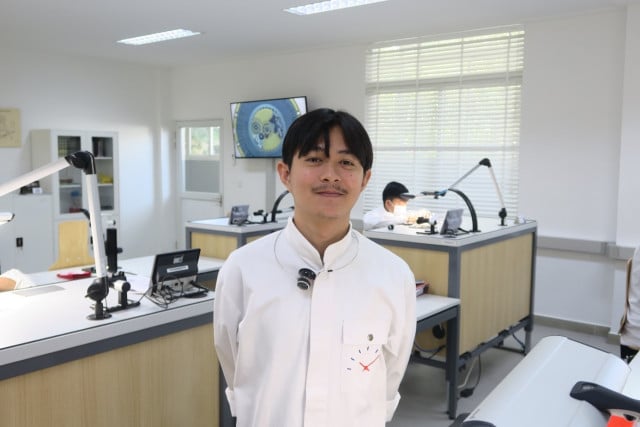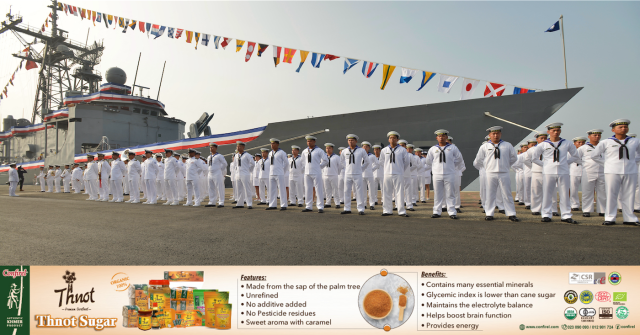‘On Time’ at Cambodia’s First Watch School

- By Nicolò Tissier
- March 28, 2023 9:29 AM
PHNOM PENH – Quietly seated behind their workbench, the four first-year students learn to manipulate tools that were completely unknown to them only a few months ago.
Meticulously, they cut, screw, polish, and assemble small pieces of metal with gears and crystal, in a hubbub of shrill noises that come from the shears, wire cutters, and machines they’re using. All of them pursue the same goal: build their own watch from scratch.
The school where the small class is learning is a one-of-its-kind in the country and goes by the name of Prince Horology Vocational Training Center. It opened its doors in 2020 in Phnom Penh’s Chroy Changvar district thanks to an undisclosed investment by the private company Prince Group, chaired by Neak Oknha Chen Zhi.
The center wants to become a pioneering place for the watch-making industry, with special attention to mechanical watches.
To do so, the center can count on the expertise of professional watchmakers and teachers Jessica Thakur and her husband, Maarben Pieters, respectively Australian and Dutch. Both have been living in Switzerland for years, where the industry is a national pride, generating 24.8 billion Swiss francs (around $27 billion) of revenue in 2022, each year, according to the Federation of Swiss Watch Industry.
Thakur started to make watches in 2002. After a 4-year training in Australia, she then worked and taught watch-making in Switzerland, while her husband has a similar professional career.

When Prince Holding Group approached them, they were both intrigued by the project. “It was so challenging,” said Thakur, remembering that she didn’t know anything about Cambodia at that time.
But after four years of going in and out of the country because of the pandemic, Thakur says she now has a special connection with it. “I adore it, Cambodia is totally unique. It is an extraordinary journey.”
The school aims to create a high-quality training program. “We apply the same criteria as other international top schools,” said Jessica Thakur, that has previously taught at the Swiss Wostep Foundation, an international reference in watchmaking education.
The school imported tools, furniture, and the sophisticated machines required to make watches from Switzerland. “There is the will to train the best,” said Thakur. “Even the tables and the chairs come from there!”
While entering the school is open to anyone, applicants must pass a series of tests to evaluate their manual capacities, concentration, and level of English. Free tuition is guaranteed for Cambodian students through scholarships funded by Prince Group.
During the first year of training, students don’t get yet to make watches. They preliminary focus on learning how to build their own tools, which they will use later to handcraft watches. Such a task takes meticulousness.
In addition, students learn how to use the specific machines of watchmaking. Special training is also given at the very beginning about security. “It is necessary to go through all the norms since the beginning,” said Thakur.
A new school year just started in January with only four students, of which two are the two first females to attend such training – the watch is still a male-dominated industry.

Only students in the second year can finally learn how to assemble, properly set up, and fix a watch, by studying all the steps and components of the manufacturing process. They focus on all the main and classical types of watches, with real models to train on.
The second-year students’ classroom is located on the second floor where, due to the absence of any noisy machinery, the sound of silence catches the ear. We find there the six school’s first graduates who operate on watches with soundproof tools and plastic finger gloves.
As they entered the school in June 2020, they are supposed to have finished their training. But due to COVID-19 disturbances these past few years, the six graduates are doing an extra year as interns inside the school, perfecting their technique, and helping successors.
As they’re not students anymore they all perceive a payment, but not yet a full salary.
“It is what I wanted in my life,” said Sak Lihvor, one of the first graduates, now an intern. Not satisfied with his former job three years ago, he saw a Facebook post about the training that immediately caught his interest. “I then was invited to pass entry tests, but I hesitated as I was afraid and nervous about working in English and with machines”.
Despite his worries, he entered the school and forced himself during the first year to handle machines. “Then in the second year, my hands were sweating at the idea of intervening on watches,” he said laughing.
“Now I feel like I’m in the right place,” he said. He describes watchmaking as a very particular discipline. “You need to be very motivated and patient because you will fail for hours on a task before being able to fulfill it.”

Lorn Sereybath, another graduated now intern, is also really satisfied with his new profession. “At first, I found really hard some elements like working with machines. But it is really satisfying to succeed despite all the challenges.”
He also didn’t like his former office job and loves the creative aspect of his new profession. “It’s funny because I don’t like that much watches themselves, as the final product, I prefer the process of making it.”
Both are considering maybe becoming teachers one day. They said they would like to help with the training of others generations of Cambodian watch-makers. With one idea in mind: participating to create a new craft field in the country.
The school’s visibility exploded recently, during the ASEAN Summits organized by Cambodia last November when Prime Minister Hun Sen gave locally-produced watches to the visiting leaders. All of them had been crafted at the Prince Horology Vocational Training Center.
It was a unique model of the Tourbillon type. The first minister, whose love for watches is well known, seemed then proud to present those watches made in Cambodia. “It was a huge publicity and prestige for us,” said Thakur.
Thakur also said homemade Prince watches are not on market yet but could be soon. It is indeed planned that during this year or the next one average-level wristwatches will be on the sell.

“Actually, 95 percent of a watch maker’s work is customer service, repair, and maintaining watches instead of making them,” said Jessica. “That’s why I prefer the French term of horloger, it is more accurate.”
Security and carefulness are primary in the watch-making field. Mostly because the equipment is very precious, and because no assurance would cover if one gets broken.
“That’s why we’re extra careful and strict about security and the use of tools,” Said Jessica. “Everyone learns to use them before even touching them.”
As the job is in high demand, all former students from the school will easily be able to find work. Especially thanks to the high quality of the training and the good reputation of their professors.
“Some of them already received offers from abroad,” said Thakur. But as the watch industry is not yet developed in the country, beside of this program, those new watch-makers would probably have to go overseas.
To conclude, Thakur said: “It would be interesting for Cambodia to be able to retain them and develop a new economical field instead.” A seed has been planted.
























